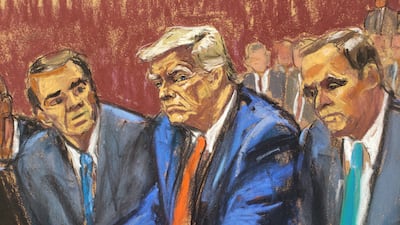Former US president Donald Trump has made unwanted history after becoming the first current or former president to face federal felony charges.
Mr Trump was arraigned in a federal court in Miami, Florida, where he pleaded not guilty to 37 charges related to his mishandling of classified documents since leaving office in 2021.
Special counsel Jack Smith has promised a speedy trial – as mandated by the constitution – but Mr Trump's legal team could slow down proceedings.
Here is how the timeline could unfold after the arraignment.
What happens next?
The timeline for Mr Trump's federal case is not too dissimilar to a separate case he is fighting in New York, where Manhattan prosecutors filed 34 felony charges against him over falsifying business records during the 2016 election.
Federal prosecutors and Mr Trump's defence team now enter the "discovery phase" of the trial, where both sides will collect evidence and gather witnesses. Prosecutors must provide the defence team with evidence it plans to use during the trial.
Lawyers will also seek depositions during this phase of the trial.
Pre-trial motions
Both sides can enter motions such as a change of venue or to dismiss the charges entirely.
Mr Trump's defence team can also file a motion to supress certain types of evidence. For example, his team can attempt to prevent prosecutors from using evidence collected from lawyer Evan Corcoran on the grounds of attorney-client privilege.
His team unsuccessfully used that tactic to prevent Mr Corcoran from testifying before a Florida grand jury. Mr Corcoran, who was not charged in the indictment, is seen as a central player in the prosecution's case against the former president.
Lawyers for Mr Trump can also file additional motions in the hope of delaying the trial until after the 2024 presidential election.
A 2024 campaign to run
Unlike other defendants facing federal charges, Mr Trump is the front-runner to win the Republican nomination for the 2024 election.
And, as he did in his case in New York, he has turned his arraignment into a campaign event by making stops at a Cuban restaurant in Florida and holding a rally in Bedminster, New Jersey, later that night.
Mr Trump was not ordered to surrender his passport, nor was he declared a flight risk, meaning he is free to campaign across the country in his attempt to return to the White House.
The constitution does not prohibit indicted persons or convicted felons to run for president, meaning Mr Trump can still run.
Candidates must be natural-born US citizens, be at least 35 years of age and been a resident of the US for 14 years. Candidates also must not previously have served two terms in office.

